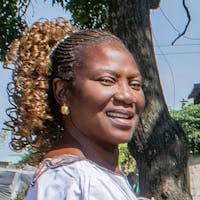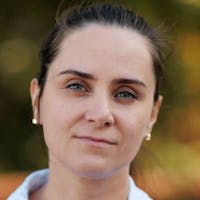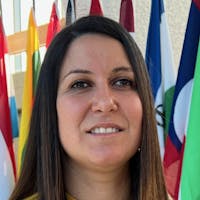My name is Elena Epuri. I am from Chisinau, the capital of the Republic of Moldova. When I was a child I loved oriental dance and dreamed of being a dancer, but I was diagnosed with infantile cerebral palsy and because of my health, I couldn’t dance.
After finishing high school, I took computer courses and then studied for three years at college to become a postal service worker.
I faced problems when I started looking for work because the postal service job I applied for included delivering big, bulky and heavy parcels. I would need to get them from shelves which were high up, which was a problem because it is difficult for me to climb stairs. The person who was in charge there said, "Look, we can't hire you because that's the way it is with us. You have to look for a post office that is bigger, where each worker has only one process to take care of." But when I tried that, transport was a problem, particularly in winter with the snow and ice, and it was too difficult for me to get there.
For a while I refused to think about getting a job. I stayed at home and my only source of income was my disability pension. My father also supported me when he had work, but when he didn't it was tough, to say the least.
But then my life changed when this wonderful child of mine, Maxim, came along and I understood that if I didn't provide for him, nobody would. So, I started looking for something new.
Maxim and I on our way to his kindergarten. He is now 5 years old.
© ILO/OITI really wanted a job and my friends suggested I go to the National Employment Agency.
When I went, they asked me what I really wanted to do and what I could do. They really listened, and they understood that I needed a job which didn’t require me to move around a lot.
When they called me and told me about a company that would be ready to hire me, I said, "What? Really?!" I was very happy and I was also nervous. They had given me a chance and I didn’t want to let them down.
I went for the interview at Steinel Electronics and was hired the same week. I felt I was in seventh heaven when I returned home with my first labour contract in hand. I had feelings of excitement and hope that were new to me.
I never miss a day of work. Each time I pick up Maxim from kindergarten, I tell him that his mum is back from work to take him home.
At work I assemble parts and then pass them on to my colleagues for the next step of the process.
© Ion BugaIn the past, when I was looking for work, employers were sceptical about my physical abilities and questioned my lack of work experience. Also the absence of workplace adaptations or long commuting distances prevented me from finding work.
A big advantage with my job is that they provide transportation. If I had to make it alone, I would need to take two, maybe three forms of public transport and I would have to walk, which would tire me out. My walker is not easy to use. I have to pick it up, squeeze it, and push it. It’s heavy. And once I get to work, I need to have strength so I can do my job. So, the transport they offer is very welcome.
After I drop off my son at school, a company driver comes to pick me up and takes me to work.
© ILO/OITMy workplace is adapted for my mobility issues and I'm glad for that. If I need something and come up with a proposal, they look for solutions. They have made the toilets more accessible, and they have installed doors that open automatically with a motion sensor. They leave other doors open, otherwise it’s a challenge for me.
What I like is that this job gives me the opportunity to meet new people, communicate every day and make new friends. I have a disability and I don't feel uncomfortable that I’m not like everyone else. Because we all can work, we are the same. Even if we come from a different background, we're the same.
I have a disability and I don't feel uncomfortable that I’m not like everyone else. Because we all can work, we are the same.
Elena EpuriWorker at electronic sensor systems company
I would like employers not to be afraid of hiring people with disabilities. How else can an employer know what a disabled person is capable of? Give persons with disabilities a try, give them a chance. I've seen other persons with disabilities at our workplace. They are big-hearted people. They are good, they jump in to help. I have a colleague who has a hearing impairment but he understands you through mimicry. People with disabilities are good workers. I'm convinced.
With my colleagues, we all have a bond. We talk, we communicate, we get along. If I need some help, I can approach any one of them.
© Ion BugaFor me this job is like a second home. Notwithstanding the problems I have, I am strong and I can look after my child and myself.
Employment is about more than just a pay cheque. It is about achieving and maintaining independence, self-confidence and supporting your family. Things have changed in the last two years. I’ve got a job, and Maxim again has a mother full of beautiful dreams. One of my dreams has already been fulfilled, I have a job, and now another, very different one is coming true - Maxim is good at breakdancing. There are many, different ways we can see our dreams fulfilled.






